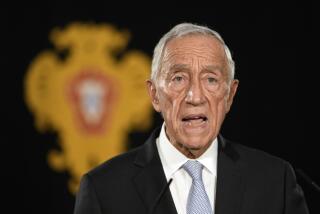1993 Vote Set : Brazil to Decide on Return of Monarchy
- Share via
RIO DE JANEIRO — A provision slipped into the constitution approved last year requires Brazilians to vote in 1993 on whether to remain a republic or return to the monarchy overthrown a century ago.
Who would be king of Latin America’s largest and most populous nation is another question, which the constitution says Congress would decide. Royalists tend to favor a descendant of Pedro II, the last king, who was deposed by the military in 1889.
Their campaign already is afoot.
“Monarchy is the cheapest, most modern and most democratic form of government,” Rep. Cunha Bueno, author of the constitutional clause, told about 150 people at the first meeting of the Constitutional Monarchic Movement.
“Monarchy defends the people against their own government. The most advanced nations in the world have it,” said Bueno, who is 38 and a five-term congressman of the rightist Social Democratic Party.
He named Japan, Sweden, Denmark, the Netherlands, Norway, Britain and Belgium.
Applause filled the salon in one of Rio’s old, establishment hotels, a room of chandeliers and crimson drapes with none of the glitz of tourism.
Brazil became independent as a monarchy, the only Latin American nation to do so. It happened in 1822 when the man who became Emperor Pedro I rebelled against his father, King Joao VI of Portugal.
After the abdication of Pedro I, his son Pedro II reigned for nearly 50 years until military officers overthrew him 100 years ago and proclaimed a republic.
In an interview, the monarchist Bueno said: “The so-called republic was actually a military coup shoved down the people’s throats. Now, finally . . . the people will be able to say what kind of government they want.”
The Monarchic Movement points out that relatively few presidents have served their full terms in Brazil and repressive military dictatorships ruled in 1930-1945 and 1964-1985.
On the other side are such as Marcello Alencar, Rio’s newly elected mayor, of the socialist-oriented Democratic Labor Party.
He told an interviewer: “Monarchism is a joke. Brazil has no tradition or political structure along those lines. Forget it.”
Comments like that do not faze Bueno. “We know we are up against a lot of prejudice,” he said, “but once the people understand what monarchy is, we will win.”
Caio Domingues, head of a large advertising agency working with the pro-monarchy campaign, said: “Brazil must rethink its form of government. The one we have now evidently hasn’t worked,”
Domingues cited current annual inflation of more than 1,000% and Brazil’s $121-billion foreign debt, largest in the Third World. He wore a golden royal crown pin in his lapel.
Ovidio da Cunha declared at the monarchy meeting: “Brazil is rotten!” He observed that federal congressmen have raised their own pay to the equivalent of about $150,000 a year while the minimum wage set by the government remains at less than $3 a day.
Da Cunha, 76, is still active as a sociology professor at Fluminense Federal University in suburban Rio. He said a king would be like “a referee in a soccer game, or like a circuit breaker that shuts off the electricity before the house catches fire.”
Bueno said most royalists want a descendant of Pedro II as king of Brazil’s 144 million people, who inhabit an area larger than the 48 contiguous United States.
There’s a potential hitch in that, however. Two heirs--the emperor’s great-grandson Pedro Gastao de Orleans e Braganca and Luiz Orleans e Braganca, great-grandson of Pedro II’s daughter Princess Isabel, claim to be the true pretenders to the throne.
Pedro Gastao, 75, said he would be willing “to explain the advantages of monarchy” on television. He lives in the former imperial summer retreat of Petropolis, founded by and named for his royal ancestor, in the mountains 40 miles north of Rio.
Domingues, the advertising man, said: “We are not going to get involved in names. The situation is very complicated. What we’re interested in is the principle of monarchy.”
More to Read
Sign up for Essential California
The most important California stories and recommendations in your inbox every morning.
You may occasionally receive promotional content from the Los Angeles Times.











